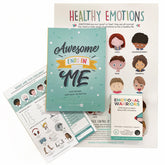Feed Your Mind
Often, when people are feeling down or anxious, you’ll hear the advice that food is the least of your concerns. And while food should never be a “concern”, your brain does need certain nutrients to function optimally.
If it’s not getting what it needs, this can manifest itself in symptoms of anxiety and sadness as well as other feelings of general unease.
By crowding in foods that support your brain, as well as engaging in certain lifestyle changes, you can potentially enhance how you’re feeling overall, both mentally and physically.
The first right of passage when it comes to improved mental health is to eat real food as often as you can. If this is all you did, you’re off to a great start as you’re naturally reducing those foods that can contribute to feeling poorly. Remember though, a little bit of processed food that you love and enjoy here and there won’t affect your mental health and if you truly enjoy it guilt free in moderation it can actually help improve it.
When it comes to mood, we can’t neglect the role our gut plays. Serotonin the ‘happy making’ transmitter is formulated in the gut, not the brain, so we need to keep it happy.
Aiming to keep your diet mainly whole unprocessed foods can sometimes be all you need to keep your gut – and yourself happy. Ensuring you include some probiotic foods (kefir, yoghurt, fermented cheeses, sauerkraut, sourdough, kombucha, kimchi etc) into your diet will help to repopulate the mitochondria which can also contribute to a better mood. One study showed that in otherwise healthy people, the right gut bugs enhanced their mood overall and reduced negative thoughts.
Probiotics are just one of many key dietary additions that can help to give our brains what it needs for improved mood.
Some other powerful players include the following:
Omega 3s These are crucial for optimal brain development and function overall and may in some cases help to alleviate feelings of sadness or anxiety though there are more studies needed. Omega 3s are found in fatty fish and fish oil capsules, nuts, and seeds.Vitamin D The sunshine supplement! Have you ever noticed you feel better when the sun is shining? I know I certainly do. The right amount of Vitamin D can positively affect our overall mood. Anyone who has survived a North American winter can attest to that! Vitamin D is required for brain function and development and can be found in fortified cereals, bread, milk and from getting a daily dose of sunshine when possible.
Tryptophan The key ingredient in making serotonin; without tryptophan, serotonin won’t be made. Because the body can’t make its own tryptophan, we need to ensure that we’re getting it from our diet. There’s a reason why it’s called an essential amino acid! You’ll find it in turkey, eggs, beef, some dairy products and dark leafy vegetables.
So, in conclusion – crowed in a variety of whole foods and you’re off to a great start. Experiment with different vegetables, whole grains, proteins and fats and keep note of how you feel.
Of course, there are so many other influences on our mental health such as lack of connection, stress and fatigue. And while food is not a cure-all, it’s a good one to have on the team.
Read more about crowding in good food in A Guide to Gentle Nutriition.
****If you suffer from depression or other mental health-related conditions, please ensure you seek the advice of a dietician, nutritionist or your doctor before attempting to treat it with supplements. If you are not ok please talk to your GP or you can find someone to talk to via our contact page – see the contact list in sidebar.

Chia seeds are a great way to get some omega 3 into your diet. Enjoy this pudding with a side of coconut yoghurt or Greek yoghurt for added probiotic benefits.
[Makes 1-2 servings]Ingredients
1 cup unsweetened coconut milk
2 tablespoons shredded coconut
1/4 teaspoon stevia or Natvia (OR 1 tsp of honey)
2 tablespoons chia seeds
1 banana
1 cup strawberries (thawed if frozen)
Instructions
Mix all ingredients together and let sit in the fridge until a pudding-like texture is created.
Click here for print version of recipe.
Michelle
About Michelle Yandle
Michelle Yandle is a Health and Nutrition Coach on her way to becoming a Clinical Nutritionist with The Holistic Performance Institute., She is also an international speaker with IISB, successful entrepreneur and two-time author with a focus on traditional diets for health, and nutrition coaching for Empowered Eating™.
Michelle has a bachelor degree from Dalhousie University, Halifax, a graduate degree in education from the University of Maine at Fort Kent, a graduate certificate from the school of Holistic Performance Nutrition and certificates in health and nutrition coaching from the Institute for Integrative Nutrition and Cadence Health in New Zealand.
More about Michelle…














